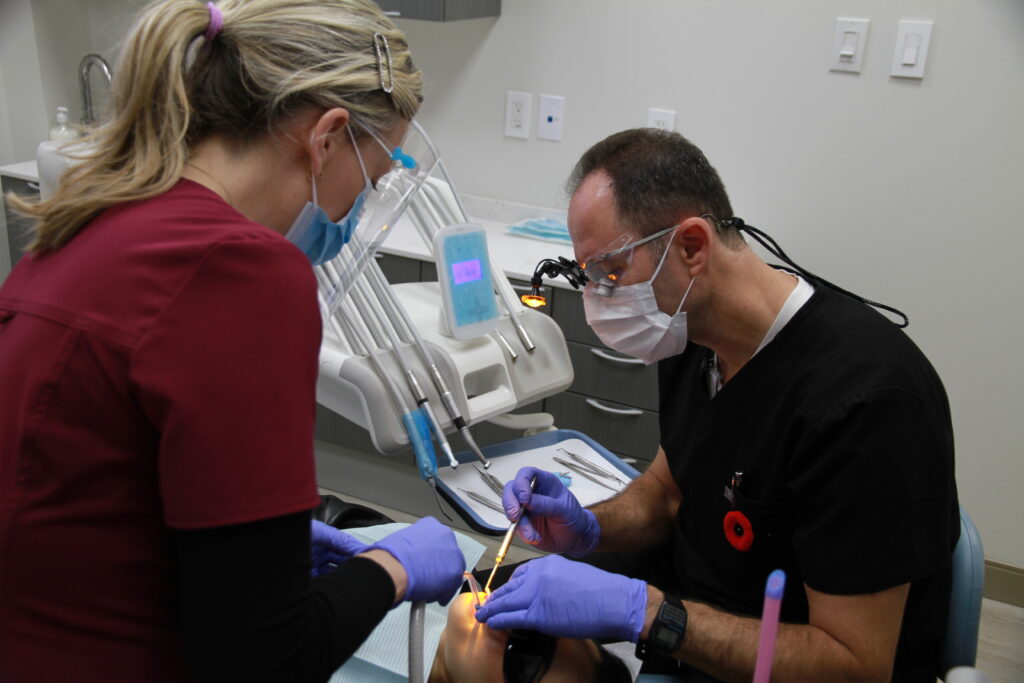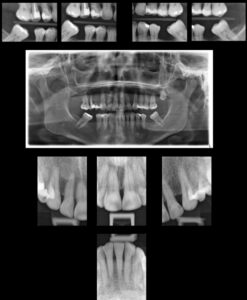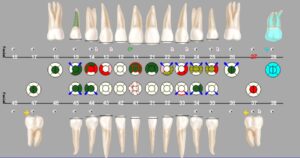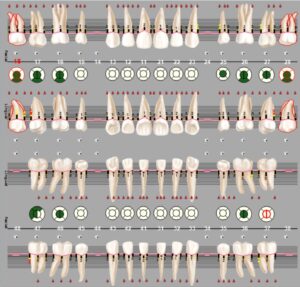Dental examinations are an essential component of your dental visit. They are important for your overall oral health and play an invaluable role in safeguarding the well being of your teeth and gums. Knowing more about the kinds of exams performed by dentists will help you appreciate why they are necessary and why regular visits to the dentist ought to be part of your regular oral health regimen. This blog entry explains what the most common dental examinations are. Hopefully, after reading this, you will have a better understanding why they may be necessary for you.
The main types of dental examinations performed by dentists are:
- Complete Oral Examination (COE)
- Recall Examination
- Specific Examination
- Emergency Examination
- Periodontal Re-evaluation
Complete Oral Examination
A Comprehensive Oral Examination (COE), as the name implies, is the most thorough examination. Typically, if you are a new patient at a dental clinic or have not had your teeth checked in several years, it is the examination you ought to have because it is comprehensive and ensures things are not missed.
The COE begins with a medical history review which includes understanding your medical conditions, medications, drug allergies, social history (smoking status, alcohol consumption habits, etc). At Leslie Family Dental, adults over 18 will have their blood pressure and pulse assessed to determine how well their blood pressure is controlled. Uncontrolled blood pressure is fairly common and may predispose one to a heart attack or a stroke. Ensuring your blood pressure is known is very important to assure everyone stays safe while at the dental chair.
Next, a full complement of dental radiographs (x-ray images) will be taken. The number and type of radiographs may vary slightly depending on the age of the patient and how many teeth they have. Typically, for an adult with a full permanent dentition, the radiograph complement would include one Panoramic image (to assess wisdom teeth, presence or absence of permanent teeth, bone levels, sinus and jaw joint structures and other features), 4 Bitewing images (showing upper and lower posterior teeth) and 4 Anterior Periapical images (showing the upper and lower front teeth). The importance of current radiographs cannot be overemphasized as they reveal features not visible to the naked eye which may otherwise be missed. For example, bitewing images can help detect cavities between the teeth which may not be detectable visually. Similarly, a Panoramic image may reveal findings that may not be captured on visual inspection alone (e.g. the absence of a developing permanent tooth, a tumor or cyst in the bone, an impacted wisdom tooth, presence of mucous in the sinus, etc). Once the radiographs are taken, an assessment of both extraoral (outside the mouth) and intraoral (inside the mouth) conditions is carried out wherein the dentist records all existing conditions in the mouth on an odontogram. An odontogram is simply a graphical representation of your teeth and includes information about such things as extra or missing teeth, cavities, fillings and their material, rotations/tipping/wear of teeth, root canal treatments, crowns, bridges, veneers, implants, and other oral findings that may be present.
At Leslie Family Dental, Dr. Weizblit will also use an intraoral camera to take a full set of intraoral photos of all your teeth and review each image with you to ensure that you are familiar with the state of every tooth in your mouth. This will allow you to better understand the rationale behind the treatment Dr. Weizblit proposes, if any.
The last part of the COE includes a full gum assessment (“Periodontal Evaluation”) in which gum pocket depths are measured.. This assessment will allow the dentist to map out the state of your jaw bones and gums at every tooth and help identify and monitor gum disease (if any). Other parameters such as gum recessions, tooth looseness (or “mobility”) are also noted as part of the gum assessment.
At the conclusion of your Comprehensive Oral Exam, the dentist will create a Comprehensive Treatment Plan tailored to address the dental issues detected in the COE. This treatment plan will be sequenced according to priority where the most urgent issues would be scheduled first. The dentist will also discuss risks, benefits and alternatives of treatments if applicable. It is important to note that a Complete Oral Examination is a snapshot of your oral state in a particular point in time. Because the state changes over time (e.g. a cavity may get bigger if left untreated, a tooth may shift position,etc), Comprehensive Oral Examinations may need to be repeated every 3-5 years, or, as the dentist deems necessary to ensure that your records are up-to-date and that no new dental issues are missed.
Recall Examination
A Recall Examination is a very quick dental examination typically conducted by the dentist during a patient’s regular cleaning appointment. The primary purpose of the recall examination is to check for caries (cavities) and/or obvious new problems in the mouth. The dentist would visually check the teeth, gums, and soft tissues, prescribe and review new radiographs if necessary according to the patient’s risk factors. The dentist would visually check for oral cancer. The Recall Exam takes approximately 3-5 minutes and is meant to identify new issues in a patient with whom the dentist already has familiarity (i.e. a patient who has been coming to the practice for a while and has had a Complete Oral Examination and had all of his/her existing conditions previously recorded). The dentist would inform the patient of the findings and the patient would book a follow up appointment for treatment if any was prescribed. Recall examinations are NOT appropriate for new or never-before-seen patients because they do not afford sufficient time for the dentist to get a complete picture of one’s dental conditions and issues. As the name “Recall” implies, the dentist cannot “Recall” something he/she never seen before.
Specific Examination
A Specific Examination is a dental examination that focuses on a specific issue or concern. The dentist may want to take one or two x-ray images of the area of concern and perform some tests to help diagnose the issue. Once a diagnosis is established, the dentist would explain it and review the recommended treatment(s) to remedy the issue. The dentist may also discuss alternatives and their risks, benefits and costs to help you make a decision that best suits your needs and expectations. A prescription for a medication may be issued if necessary. Occasionally, a referral to a Specialist may be given if the dentist feels that the issue at hand requires more highly skilled approach to address it. It is important to realize that a Specific Exam is, as the name suggests, specific. It does not cover the entire mouth and is not meant to address multiple different issues all at once. Because the treatment needed for an issue brought up in a Specific Examination is only determined at the specific examination appointment, the dentist may not have sufficient time to treat the issue and a follow up appointment may be necessary. If the time is available, the dentist would render the necessary treatment.
Emergency Examination
An Emergency Examinations is another type of a dental exam, typically booked on short notice to address urgent concerns such as pain, swelling, discomfort or trauma. It is more urgent in nature than a Specific Examination by virtue of the fact that there is more discomfort associated with the dental issue. Emergency exams often call for a limited number of radiographs of the affected area to be taken in order to quickly and accurately diagnose the issue. The dentist would communicate the diagnosis along with the recommended treatment or treatment options. Similarly to Specific Examinations, a prescription for a medication may be issued if necessary and a referral to a Specialist may be given if the dentist feels that the issue requires more highly skilled care to address it. Because Emergency Examinations are often booked on a short notice, the dentist may not have sufficient time to treat the issue and a follow up appointment may be necessary. However, the dentist would do their best to get you out of pain at least temporarily. If the time is available, the dentist would render the necessary treatment.
Periodontal Re-Evaluation
A Periodontal Re-evaluation is a repeat examination of the gums (similar to the one done as part of a Complete Oral Exam). Gum pocket depths are measured for every tooth, recessions and mobilities are noted. This examination is especially important in monitoring the state of gum disease as it allows the dentist to compare historic gum measurements with current measurements and determine if there is improvement, worsening, or stability in gum pocket depths. Depending on the findings, the dentist would decide on the best treatment strategy. For example, the dentist may recommend altering the frequency of dental cleanings, or, may recommend a referral to see a gum specialist (periodontist) for specialized gum surgery, or, may suggest therapeutic intervention such as antibiotic mouth rinse or antibiotic pills to address a worsening gum condition. Periodontal Re-Evaluation focuses on the gums and is NOT geared towards detection of caries (cavities).
In summary, when choosing a new dental office to take care of your oral health, undergoing a Complete Oral Examination (COE) is the best way to ensure the dentist gets to know you and your mouth as thoroughly as possible. Skipping the COE and jumping into treatment of a nagging dental issue may be enticing and appear more economical at first, but runs the risk of taking the focus (and budget) away from other more urgent issues that may be hidden from view. With a properly conducted COE, you’ll gain peace of mind knowing that your dentist has an in-depth understanding of your oral conditions and has devised the most appropriately prioritized Comprehensive Treatment Plan for you without missing any issues. Regular recall examinations are vital in keeping your oral health in a good state afterwards.
Don’t put off getting a dental check up! You deserve a healthier smile. Give us a call today to book an oral examination. (289) 453-0606
Written by Dr. Yan Weizblit DDS




